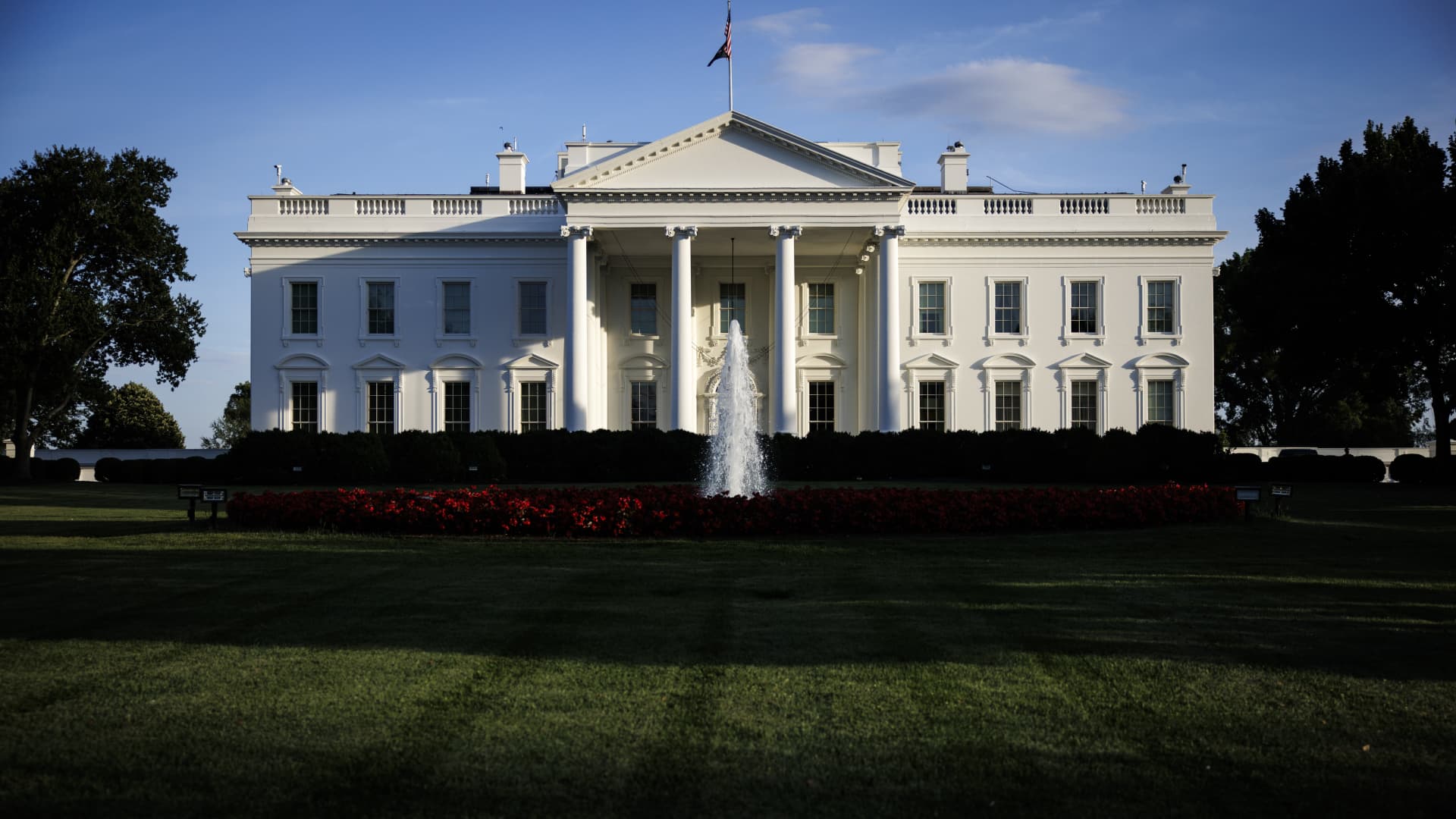Bags of heroin, some laced with fentanyl, are displayed before a press conference at the office of the New York Attorney General regarding a major drug bust, Sept. 23, 2016.
Drew Angerer | Getty Images
The Biden administration unveiled a plan Tuesday to eliminate the growing threat of fentanyl laced with xylazine, an illegal street drug cocktail that is fueling a wave of overdose deaths.
The plan directs several federal agencies, including the Centers for Disease Control and Prevention as well as the Food and Drug Administration, to expand access to testing, prevention and overdose recovery resources. It also aims to disrupt the illegal xylazine supply chain, among other efforts.
Those agencies must develop and submit an implementation report to the White House in 60 days.
Fentanyl is an extremely potent synthetic opioid with its own soaring death toll. Xylazine, also known as “tranq,” is a cheap animal sedative not meant for human consumption.
The plan is the administration’s first concrete action to address the dangerous combination since declaring it an “emerging threat” in April.
It also builds on President Joe Biden’s national drug control strategy — which aims to tackle the country’s addiction and overdose epidemic — and his administration’s other efforts to crack down on illegal fentanyl.
“Even as we work to save lives from illicit fentanyl, this administration is hyper-vigilant in reacting to changes in the drug supply, like xylazine,” Dr. Rahul Gupta, director of the White House Office of National Drug Control Policy, said during a call with reporters Monday.
The White House plan’s long-term goal is a 15% reduction in xylazine-positive drug overdoses in at least three of four U.S. Census regions by 2025.
Xylazine was detected in nearly 11% of fentanyl overdose deaths through June 2022, according to a report from the CDC released last week, up dramatically from about 3% of cases in January 2019.
“The proportion of xylazine-involved deaths is continuously growing and is a great concern. Every one of these numbers is tragic,” White House domestic policy advisor Neera Tanden said during a call with reporters. “They represent individuals, families and communities torn apart.”
The U.S. has been grappling with an opioid epidemic for years, and xylazine only adds to it.
Drug dealers often mix the tranquilizer with fentanyl to extend the duration of the opioid’s effects, which can include relaxation and euphoria. But dealers may also use xylazine as a cheap bulking agent to boost their supply of fentanyl.
Xylazine can do major damage to the human body, including leaving drug users with severe skin ulcers, soft-tissue wounds and necrosis — sometimes described as rotting skin — that can lead to amputation.
Treatment, testing and supply reduction
Fentanyl laced with xylazine poses several health threats, including severe hypoventilation, the development of serious wounds and extreme withdrawal symptoms.
To address those health challenges, the administration’s plan will develop and deploy a treatment framework for patients exposed to xylazine. That involves identifying the most effective practices for withdrawal management and clinical stabilization, or returning a patient to constant and steady function.
The plan will also evaluate and deploy overdose reversal strategies that health-care providers, first responders, harm reduction staff, drug users and community bystanders can use.
Those strategies will focus on the use of assisted breathing, hands-only CPR and naloxone, the first medicine approved in the U.S. to reverse opioid overdoses.
Naloxone, marketed as Narcan, is effective against fentanyl but may have an insufficient response against xylazine since the tranquilizer is not an opioid.
Even then, Gupta said, “I want to stress that these medications should still be used regardless.”
The plan also aims to ramp up testing for xylazine in other drugs.
That involves developing and authorizing rapid test strips for clinical settings and deploying tests “at all levels of the supply chain, from wholesale seizure quantities to retail levels within communities,” according to the plan.
It also includes standardizing testing practices across medical examiners, coroners, public health laboratories and drug analysis laboratories.
“Testing is currently ongoing in community and law enforcement settings, but not enough,” Gupta said on the call. “We need more testing.” Gupta said xylazine can be purchased from online vendors in China and Puerto Rico. “To a lesser extent,” some drug traffickers are mixing xylazine with fentanyl in Mexico, according to Gupta.
Another major component of the plan will identify the specific sources of xylazine and determine whether the tranquilizer was diverted from legitimate supplies or synthesized for illegal use. The plan will also enhance the Biden administration’s ability to regulate the xylazine supply chain while maintaining the tranquilizer’s availability for legitimate uses in animals in research.
The administration will also explore potential regulatory options for disrupting the production, distribution and sale of illegal xylazine, according to the plan.
That could potentially include scheduling xylazine under the Controlled Substances Act, which would designate a rating for the tranquilizer according to its abuse risk.
The administration will also consider potential avenues for prosecuting those who manufacture, import, export, sell or distribute xylazine to support fentanyl trafficking.
The last two components of the plan are scaling up research efforts on xylazine-laced fentanyl and developing an epidemiological data system to track the spread and effects of the drug combination.
The “good news,” is many actions outlined in the plan are “already underway,” Gupta said.
For example, the Drug Enforcement Administration in March warned the American public of a sharp increase in the trafficking of fentanyl mixed with xylazine. A month earlier, the FDA restricted the unlawful entry of xylazine in the U.S.

